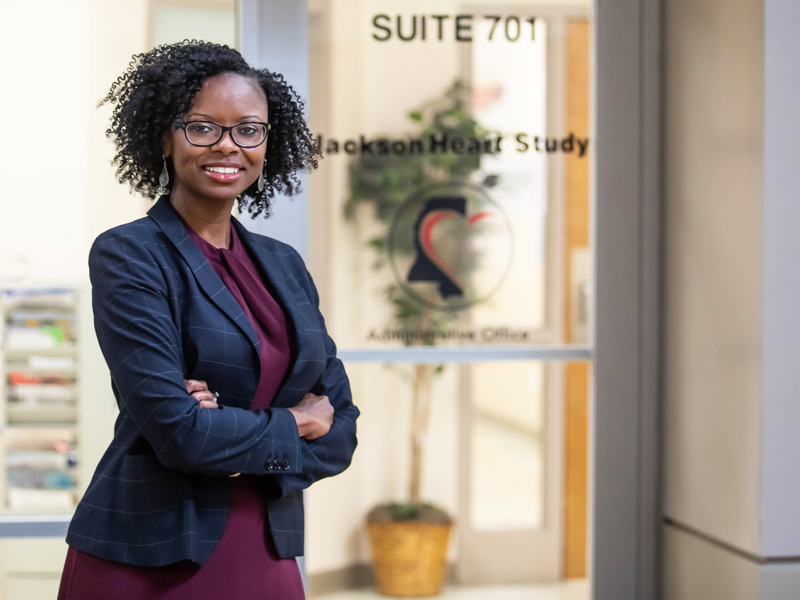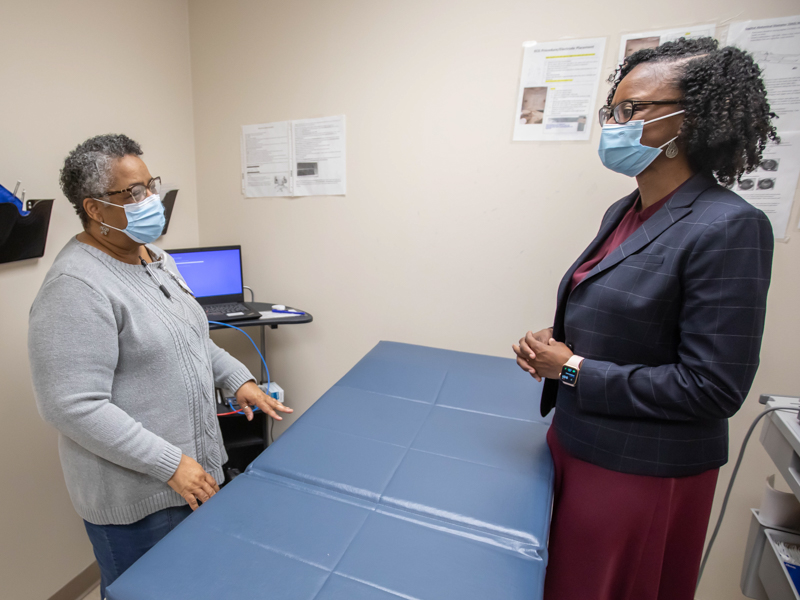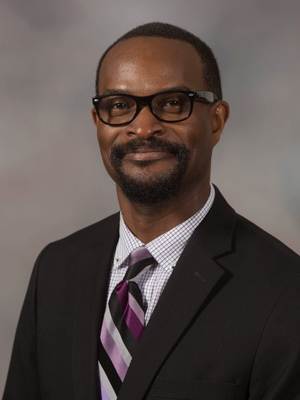Carson takes helm at Jackson Heart Study

As an epidemiology PhD student at the University of North Carolina at Chapel Hill, Dr. April Carson learned about a new study on heart health.
The fledging project was recruiting thousands of Mississippians to conduct the largest-ever study of cardiovascular disease in African Americans. It was exactly the data Carson wanted to use in her dissertation.
However, the Jackson Heart Study did not have data available yet, and would not for several years.
As the study built its reputation for community-centered research, Carson built her own profile as a renowned epidemiologist. Today, she has no problem accessing the data as the new director of the Jackson Heart Study (JHS).
“Two decades later, and I’m back,” Carson said. “It’s a full-circle moment.”
Today, the JHS is a collaboration between the University of Mississippi Medical Center, Jackson State University, Tougaloo College, the Mississippi State Department of Health, the National Institutes of Health and thousands of Hinds, Madison and Rankin county residents. Its three components – research, education and community engagement – all support the overarching goal of understanding and reducing the risk of cardiovascular disease among African Americans.

“We have many partners, but we are one study working together to improve the health of African Americans in Mississippi,” said Carson, who joined the JHS and UMMC as a professor in the Department of Medicine and Department of Population Health Science on September 20, 2021.
Carson is no stranger to cohort-based studies. Her dissertation research in cardiovascular epidemiology included data from the Atherosclerosis Risk in Communities study. Now in its 35th year, that project’s Jackson site is still running strong at UMMC and was one of the recruitment pools for the Jackson Heart Study.
As associate professor and associate dean for diversity, equity and inclusion at the University of Alabama Birmingham School of Public Health, Carson was an investigator with the CARDIA (Coronary Artery Risk Development in Young Adults) and REGARDS (Reasons for Geographic and Racial Differences in Stroke) studies. She has also worked with the JHS data, co-authoring publications on hypertension and diabetes.
Her research focuses on diabetes and hypertension. She has a Centers of Disease Control and Prevention-funded grant to study the community-level factors that contribute to the greater burden of these diseases in the southeastern United States.
“This is a multi-site study in which we are examining neighborhood resources such as fresh food availability, walkability, and distance to public parks and their relationship to cardiovascular disease risk,” Carson said.

“Her experiences at UAB demonstrate research management skills that are critical to lead the Jackson Heart Study,” said Dr. Mario Sims, chief science officer for the study. “She understands the dynamics and layers of such a study, including organizing, deliverables and mentorship.”
While she will continue some work on these projects at UMMC, Carson will also lead JHS’s research on similar topics in addition to developing new ways to apply the study’s findings.
“One of my goals will be focusing on how we can take what we have learned about cardiovascular health in JHS and implement it in local communities,” Carson said. “For example, there are programs that are effective for lowering blood pressure, but these have not been very successful when carried out in different community settings.
“The JHS can help address this issue while also training future scientists and public health professionals so that ultimately, we improve cardiovascular health for generations to come,” Carson said.
Carson is an “all-star who is well-trained in cardiovascular epidemiology and health disparities research,” said Dr. Michael Hall, associate professor of medicine at UMMC, JHS investigator and member of the search committee that selected Carson for the role.
Dorothy Horton, a clinical research nurse at the Jackson Heart Study, said Carson is a strong leader.
“She’s personable and easy to talk to,” Horton said. “She’s done a marvelous job with the study so far and bringing in her expertise.”
Since taking leadership, Carson has prioritized meeting with staff and organizing team-building activities focused on communication and intergenerational collaboration.
“We at the Jackson Heart Study work together pretty well, but this has given us a chance to learn more about one another,” Horton said.
Communication is a critical part of the JHS. The study stays connected with thousands of people through annual follow-up calls, newsletters and community events. The COVID-19 pandemic has limited that last method for nearly two years. Participants at higher risk for severe COVID-19 have spent a lot of time at their homes, Carson said.
Despite a pause on large social gatherings, Carson has found other ways to introduce herself to participants. In October, she greeted many through one of the pandemic’s socialization solutions: a drive-thru visit at the Medical Mall that included goodie bags and a COVID-19 vaccination drive.
“It was a chance to say hello and to keep the interaction safe,” Carson said.
She also receives phone calls from community members. One called to tell Carson that their recent visit to the Medical Mall “was the best exam I’d ever had.”
That exam is the long-awaited Exam 4. Delayed more than a year by the COVID-19 pandemic, this phase of the Jackson Heart Study involves a full health exam of the participants. It’s the first such visit since Exam 3 ended in 2013.
Carson calls the Jackson Heart Study a “phenomenal” model for research. The first exams formed the basis for hundreds of publications. The JHS communicates those results to participants through summaries, data books and other materials made accessible for non-scientists.
“The Jackson Heart Study has collected extensive data to help us learn about health changes over time,” Carson said. “In Exam 4, we’re adding new measures including devices to monitor movement and activity levels.”
Because the participants are now 20 years older than they were at the start, the JHS will also implement its first in-depth data collection on aging-related changes to cognition and physical function.
One thing that hasn’t changed? The pride and exuberance participants and staff have for the study and its mission.
“There is a lot of energy and excitement among the participants, and they continue to be steadfast supporters of this study,” Carson said. They are still willing to come in [for exam visits] and answer our phone calls, and we want to make sure we uphold our commitment and responsibility to them—as there is no JHS without our study participants.”
The Jackson Heart Study invests in its future by training a new generation of health professionals. Through its education programs, high school, college and graduate students learn about cardiovascular disease, public health and epidemiology.
“It doesn’t necessarily mean they will all go into public health,” Carson said, but Jackson Heart Study scholars do become health professionals, scientists, lawyers or enter other careers that use the STEM-based skills they gain.
“One fortunate consequence of the pandemic is that almost everyone has heard of epidemiology now,” Carson said. “This has also led to more people wanting to learn about research.”
As a student, Carson herself participated in a public health training program that enriched her childhood curiousity about science and medicine. Multiple trips to the hospital with and visiting her grandmother, a heart failure patient, also spurred her interest.
The JHS is not the first project to examine the causes of heart disease, stroke and other conditions.
“When people talk about the major risk factors for heart disease, such as high blood pressure and high cholesterol, they are talking about knowledge that was first established by the Framingham Heart Study,” Carson said.
This 70-year, three-generation cohort study demonstrated the roles of diet, exercise, tobacco use, cholesterol and hypertension in disease heart disease. While Framingham is important, it is not representative of all Americans, Carson said. The early participants were predominately white, lived in a small northeastern city and now, in a different century.
“We have learned a lot from Framingham, but we cannot take their study’s findings and assume they apply the same to everyone,” Carson said.
That’s what makes Jackson Heart Study so important: It takes into account the lived experiences of its participants and their families in ways other studies cannot, Carson said.
“Jackson Heart Study allows us to ask different and deeper questions. For instance, we can ask about [racial] discrimination and how those experiences affect health,” Carson said.
“It is an honor for me to be the director of the Jackson Heart Study,” she said. “While I am quite familiar with JHS and its long, rich history, I am excited to now become a part of the Jackson community and join the outstanding JHS staff members and partner institutions to build upon this storied foundation.”


